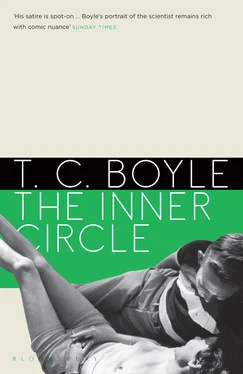One time — and this was after Rutledge had joined us and the Kinsey children were grown and out of the house — Mac came along with us on one of our expeditions, just to participate, to do something other than housework for a change. I can’t recall now where it was, some uninspiring midwestern college town, no doubt, a place little different from Bloomington, and it was probably winter too, so that even the scenery was unrelieved. We checked into a hotel, the usual arrangement, and got two adjoining rooms, Prok, Mac, Rutledge and I, Corcoran having stayed behind to man the fort at the Institute. Mac entertained herself as best she could while we recorded our interviews — she might have gone to the snowbound park or poked in at the library or a thrift shop, I don’t know. Afterward, we had a late supper and went up to the rooms, where I assumed Prok and Mac would retire and leave Rutledge and me to fend for ourselves. But Prok was especially keyed up that night, pacing round the floor and going on about his enemies — their legions had grown over the years — and some of the oddities that had come up in the interviews that day. And films. He was just then pioneering the use of film in recording the mating habits of various species of animal, and I remember he was particularly excited about the work of a Professer Shadle at the University of Buffalo, who had apparently documented the reproductive behavior of captive porcupines. “Porcupines!” Prok kept exclaiming. “Can you imagine that? With all that defensive armor? And yet they still, of course, manage coitus, or where would the species be?”
Mac was right there with him, never shy about expressing her views, and Rutledge was fully engaged too, interjecting opinions, pulling his chin over this thought or that, waving his hands in expostulation; I was content to sit back with a Coca-Cola and listen, though I wished I could have lit up a cigarette. (About Rutledge: he was a Princeton Ph.D. in Cultural Anthropology, thirty-eight years old, a neat, limber man with a slight stoop and a sardonic grin who wore a wire-thin mustache in homage to his Iberian ancestry on his mother’s side, and maybe even to Duke Ellington too. For what it’s worth, incidentally, Prok detested all facial hair, arguing that only someone with something to hide would want to mask his features.) After a while, the subject turned from porcupine sex to human sex and Prok’s usual gloss on the mores of the day — we were all too inhibited, he insisted, even those of us in the highest ranks of sex research, those of us right there in that very room. “Oh, really?” Rutledge put in, rising to the bait. “How so?”
“Take Mac, for instance,” Prok said, catching himself up in midstride. “Here’s an engaging, desirable woman sitting right here with us as we jaw on about sex, and we haven’t given a thought to taking advantage of the situation, now have we?”
“What do you mean?” Rutledge was leaning against the far wall, an empty soft-drink bottle and a half-eaten hamburger sandwich on the bureau beside him. Two quick nervous fingers went to his mustache.
“To enjoy ourselves with her, obviously. You’re willing, aren’t you, Mac?”
Mac, seated in the armchair with her knitting, glanced up sharply, then looked away. She murmured something that sounded like assent, and I felt myself go numb. I couldn’t look at her. I wanted to get up out of the chair, push through the door and go out into the dark streets of a city I didn’t know and didn’t care about and just walk till my legs gave out. It wasn’t jealousy I was feeling, but something else altogether, something I couldn’t have put in words if you’d asked me.
“Oh, but that hardly proves anything — that’s just convention.”
Prok’s eyes were glowing. “My point exactly.”
There was some further debate, Mac’s opinion solicited, mine, the ball going back and forth between Rutledge and Prok, but ultimately Prok made a challenge of it: either we expressed ourselves sexually, without inhibition, or we proved his point. “Actions speak louder than words, wouldn’t you agree?”
Was she enthusiastic? I couldn’t read her, but all traces of her girlishness had vanished and she’d put on her objective face — this wasn’t what she’d come for, wasn’t what she’d expected. Rutledge — he was married, the father of two — seemed nonplussed. “But go ahead,” Prok insisted, “enjoy yourselves — Rutledge, you’re the new man, why don’t you go first?”
What I’m trying to indicate here is that Iris’s feelings were by no means unique, though I understood and wanted only to placate her, to love and support her and give her everything I had to offer, emotionally and physically both. “Iris,” I said, “come on. Let’s not fight.”
“Keep them,” she said, even as the thunder rattled the windows and drummed at the walls, “and all the rest of your Mexican delicacies.” Her face was featureless in the dimming light. “I can eat meat loaf.”
“Are you listening to yourself? That’s ridiculous. You don’t have to—”
“Or salt pork. Or hardtack,” she said, and she was smiling now, her beautiful smile, enriched with softness and sympathy. “Give me hardtack any day.”
I reached out and stroked the back of her hand. “Okay, point taken. I’ll never mention tortillas again.”
Before she could respond there came a plaintive choked cry from the kitchen, something very like a cat’s mewing, followed by the thump of a compact body springing from sink to floor, and in the next moment the bead curtains parted and I found myself staring into the unblinking yellow gaze of the biggest tomcat I’d ever seen. “What’s that?” I asked stupidly.
“A cat. His name’s Addison.”
“You’re kidding,” I said.
She ignored me. “Here, Addison. Come here, boy,” she cooed, and the cat, which had frozen at the sight of me, began to inch across the carpet on its abdomen. When it reached the couch it sprang up with a practiced leap and settled down in her lap.
“But we can’t have a cat. You know I’m allergic, and its food — it’s an expense. I mean, who’s going to pay for the food?”
The cat had begun to purr, a ratchety shifting of breath from nostrils to larynx to lungs and back again. She was stroking the thing. “I need company, John.”
I said nothing. The rain drooled from the gutters.
“If you’re not going to be here, that is — and I don’t think you have anything to say about it, not being gone, what, thirty-four days? In a row? Without so much as a phone call?”
It would have been fitting for a thunderclap to shake the house then, but it didn’t come. Or maybe it did. Maybe I’m misremembering.
“And there’s another thing. And I don’t care what you say.” She brought her face to mine, closing the gap over the cat and the hand that was stroking him instead of me, her eyes hovering, her lips, her teeth, the sweet scent of her breath. “I want a baby, John. I’ve made up my mind.”
And now it came— Boom! — and everything rattled, right on down to the dishes in the cupboard and the knives in the drawer.
Things settled down for a while after that — or settled into a routine, at any rate. We traveled a bit less frequently that fall, as a threesome, that is, Prok and Corcoran going off on two separate jaunts to New York and Philadelphia, making contacts and bagging histories along the way, and in their absence I punched the clock and focused on the affairs of the Institute. I didn’t mind. It was good to be home and spending more time with Iris, though of course I was still on the road a great deal and when I wasn’t, I have to confess I did miss the excitement of the chase. In some ways, I suppose, a habituation to routine and the quiet, ordered life was suited to my temperament, but there was another part of me altogether that yearned for the road, for adventure, and once Prok had opened up that world to me I could never get enough of it.
Читать дальше












